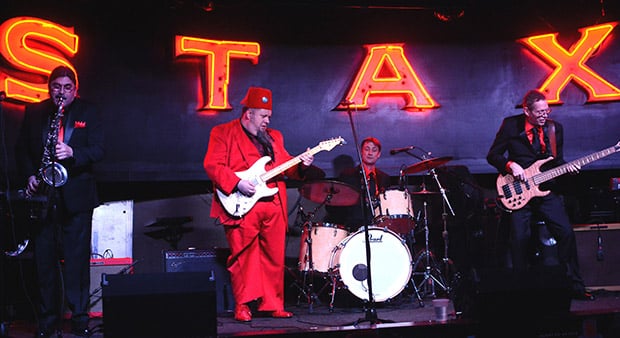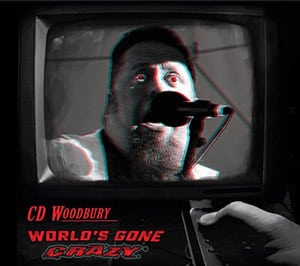
Tim Parsons / Tahoe Onstage
There will not be a release performance tonight, but CD Woodbury and his bandmates can take solace in their completion of a fantastic, 13-song album — and that they have their health after surviving the first major outbreak of coronavirus in the United States.
The band is based in Seattle and Washington state was hard struck in March by what would become a worldwide Covid-19 pandemic. “We all got sick at the same time, so we are pretty much convinced that it happened at a gig we did on the 14th of March,” Woodbury said.
Each of the members has recovered, but the pandemic delayed the album’s mixing, mastering and printing. Of course, it also has prevented any live shows. The album is appropriately titled “World’s Gone Crazy.”
The Emerald City band’s gemstone is a diverse collection of originals, including a humorous novelty song, along with an earful of unique interpretations of covers. A charismatic and fun band to see in person, CD Woodbury’s live flavor comes across in this studio album. The style is blues-based and the sound includes tasty, funky saxophone from Mike Maring, four-part harmonies, Woodbury’s guitarwork — mostly exquisite but sometime swampy with a slide — and an authentically near perfect rhythm with drummer Don Montana and bassist Patrick McDaniel.
Grunge digs for trade
Montana’s day job is in construction and he worked out a trade with Robert Lang for several days in the fabled studio where albums were recorded by bands such as Nirvana, Foo Fighters and Soundgarden.
It was recorded live and most songs were cut in just one or two takes. A computerized click track was not used, which is rare nowadays.
“With blues you can still be a little more organic, a little more real. That’s why I enjoy doing what I do,” Woodbury said.
An homage to the city’s rock icon Jimi Hendrix is “Hey Joe,” a tune Woodbury unsuccessfully attempted to record on previous albums. This time it worked, in just one take and with one tiny mistake – another nod to live blues.
The blues. Sorry, we keep mentioning it. The room’s elephant is easy to identify when the “World’s Gone Crazy.”
The Great Northwest hosts the Waterfront Blues Festival, the largest such gathering west of the Mississippi River, and the blues societies in Portland and Seattle are two of the largest on earth. Washington and Oregon are located in one of the least culturally diverse regions in the nation.
Why blues works
Woodbury explains why “blues works” as a definition for his sound, along with his conundrum when doing so: “Everyone says, ‘Keep the blues alive,’ and I like to believe the best way of doing that is to keep it a living music.
“I’ve got the music degree, a piece of paper from Portland State University, where you study stuff like classical and jazz music. You look at jazz music, which is derived from the blues, and it started out as American popular music, but now it’s something that’s taught in the schools as opposed as being taught on the bandstand. Like classical music, you have a bunch of scholars saying this is what this music is. So, if I tell people I’m a blues artist, I have to be careful because blues is based off a culture that’s not mine. It’s the culture of 400 years of the black experience in America, particularly the Jim Crow era up through today.
“As a white guy to say I’m a blues artist, typically people will look at me and figure I’m a musicologist or I play ‘60s-derived classic rock. I like those styles of music, but I can’t do either one of those things and consider it to be living music because both things are ‘This is what this is’ – type of thing. So, what I’m trying to do is to be a living music. I’m trying to pull back in all these derived styles they come from.
“You know, country music comes from the blues, rock and roll comes from the blues, jazz comes from the blues, funk comes from the blues. Basically, just about every style of American music has some direct tie to blues music. I like to take some of those elements and put it into the forms that are still there. Typically, I’ll call myself an artist that’s into American roots music but that isn’t a great description of what I think I’m doing. So blue works.”
Challenges in Memphis
It is undeniable that CD Woodbury is loved by blues fans. It has twice been the Washington Blues Society’s representative at the International Blues Challenge in Memphis. To give an idea of how competitive it is to attain that honor consider that Washington has had two overall IBC champions in recent years (The WIRED! Band In 2012 and Ben Hunter & Joe Seamons in 2016). CD Woodbury reached the semifinals both years before being knocked out by the eventual winners.
CD Woodbury’s memorable performances have won two more return trips during the IBC to Memphis, where the band was dubbed “Kings of Beale Street.” To be getting paying gigs as hosts of showcase jams at Jerry Lee Lewis Café & Honky Tonk” when there are 250 blues bands in town is quite a tassel on the fez cap that Woodbury likes to wear onstage.
He wrote two of the songs on “World’s Gone Crazy” specifically for the IBC: “Memphis Heat” and “Walk Around Music,” the latter including the verse: “I’m a big man with two left feet, can’t dance but can’t stand still.”
On “Can’t Eat That Stuff No More,” Woodbury narrates his doctor’s dietary warnings. Did you know SlimFast tastes all right when Kahlua and ice cream are added?
If the blues have the trait of self-deprecation, Woodbury has them. He laments not playing slide as well as Derek Trucks or Sonny Landreth. He’s not alone in that company. But he touches on the style of those virtuosos on the new album, which opens with acapella harmonies followed by a raucous slide celebration “Follow The River Home.” I hear a little Roy Rogers in there, too.
The album is, indeed, a celebration. Woodbury played for years with pain, his fingers feeling like “pins and needles.” Except for a few weeks of basic training in the Army, Woodbury said he hadn’t been away from his guitar for more than a day since he was 14.
He had carpal tunnel surgery on both hands and didn’t play at all for more than six months. But since he recovered, he can play with no pain and for up to four hours straight. He reassembled a band (Robert Baker is the new bass player), cut the record and planned a summer filled with shows.
But now that the “World’s Gone Crazy” Woodbury is spending his time in a tiny Jefferson County town north of Seattle, further enhancing his guitar playing, writing songs and plotting a follow-up album to the one that could lead to another trip to Memphis, this time for the Blues Music Awards. That is, if some of the craziness subsides.
— Tim Parsons

- CD Woodbury
- ‘World’s Gone Crazy’
- Release: July 24, 2020
- Favorite tracks: ‘World’s Gone Crazy,’ ‘Adeline,’ ‘Emerald City Blues’
